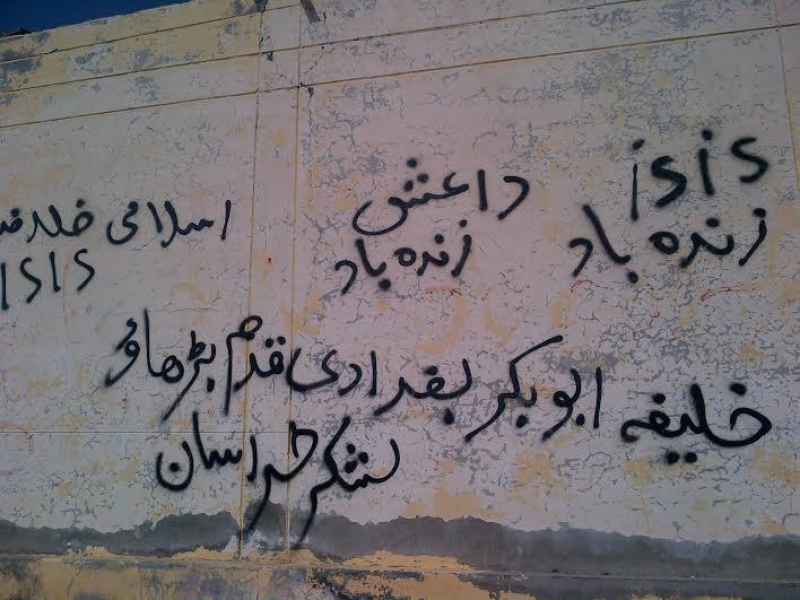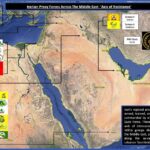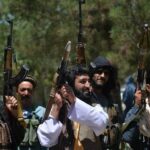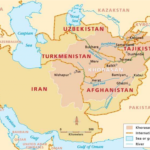It seems like the terrorism problem in Pakistan is going to expand at an alarming rate with the new revelations about ISIS collaborating and recruiting in the country. Yes, yes, I know… the ‘honorable’ Interior Minister still doesn’t believe that ISIS has entered the country, much less is a threat to peace in the nation. But then, he also doesn’t see Abdul Aziz and the Lal Masjid brigade as a threat to Pakistan. There are some things that happen outside the scope of the rotiwala that he frequents for information and intelligence.
Over the past week, we have learned that ISIL “Khorasan” has formed a “military alliance” with the Pakistani Taliban, Lashkar-i-Islam, and Jamaat-ul-Ahrar to counter the successes that the Pakistan Army has achieved in the Khyber Agency and other Afghan border areas. This would be a crushing blow, if we didn’t understand the dynamics that go into this alliance.
Understanding the players
Lashkar-i-Islam, Mangal Bagh’s group of criminals and warlords, is confined to Khyber Agency. LiI has continually been involved in kidnappings for ransom from Peshawar and Hayatabad to generate funds for its on-going fight. They have been handed heavy losses both by the Pakistan Army and deserters due to the flogging that they have received. Mangal Bagh’s own influence has been weakened due to this loss of fighters and he needed to introduce something that could be considered a game changer.
Jamaat-ul-Ahrar became an offshoot of the TTP in September 2014 and named Omar Khalid Khorasani as their commander. Ahrar has had a few ‘spectacular attacks’, using the vernacular of the terrorists including the Wagah border and an attack on the MQM in Orangi Town. This, however, was the second splinter group from the mainstream TTP led by Maulana Radio.
Ahrar-ul-Hind was the first in February 2014, headed by Maulana Umar Qasmi (formerly Lashkar-e-Jhangvi) who split because of the negotiations with the Government of Pakistan. Ahrar-ul-Hind took with them many members of the Mehsud clan, as well as some members from the Punjabi Taliban. Yes, I know the Chief Minister Punjab doesn’t agree that there is a Taliban in Punjab, but then he is from the same party as the ‘honorable’ Interior Minister. Ahrar was responsible for the attack on the Islamabad High Court in March 2014. They have now joined forces with Jamaat-ul-Ahrar.
What I find interesting is that Jamaat-ul-Ahrar, in September 2014, immediately after splintering from the TTP announced an alliance with al-Qaeda and Ayman al-Zawahiri, who called them the new “al Qaeda in the subcontinent.” The new alliance seems to show that the new al-Qaeda equation didn’t perform as expected.
ISIL Khorasan is a shadowy group of between 15 to 50 fighters that battle-hardened al-Qaeda members. They are on a threat index due to their interactions with al-Qaeda – Arabian Peninsula (ADAP) on testing an explosive device that cannot be detected by airport security in the West. For those who have recently traveled to the United States, the requirement that all laptops and cellphones be fully charged before boarding is because of this group.
The new group that has engaged with the above-mentioned militant groups come from within Jabhat al-Nusra originating from the Afghanistan-Pakistan border region. The name Khorasan refers to a province under an ancient Islamic caliphate that included parts of Afghanistan, Iran, Pakistan and northern India.
The Sum of All Parts Equal?
Let’s understand how all of these parts total up to the complete equation that we are looking at today.
After Lashkar-i-Islam was forced out of Bara, the hashish-producing region of Khyber, Mangal Bagh reached out to his former associates in the TTP for assistance to maintain control over the Tirah Valley, the crossing channel for Pakistani militant moving into eastern Afghanistan. The TTP provided the required fighters, but in return Lashkar-i-Islam assisted in the attack in Army Public School in Peshawar in association with Jamaat-ul-Ahrar, who claimed responsibility for the attack.
The attack was launched and controlled from the Nangarhar province in Afghanistan, which borders Tirah.
Why is Tirah important? When the TTP, Lashkar-i-Islam and Jamaat-ul-Ahrar lose control of the Tirah Valley, the Pakistani leadership of ISIL Khorasan would be cut off from their own bases of operation and fighters in Khyber, Mohmand, Waziristan and various settled districts of northern Pakistan. Thus, effectively ending their control over the militant groups operating in Pakistan.
So here’s what we know. All of these groups were once working together as TTP, or its affiliates, until the death of Baitullah Mehsud. When Maulana Radio took over leadership, with the recommendation and blessings of Mullah Omar, the factions splintered, combined and coordinated until we reached where we are now – all of them working together again to save themselves from the successes of the Pakistan Army in the tribal regions and the settled districts of Pakistan.
What we understand from all these maneuvers? The terrorists are obviously in serious trouble to be looking to the likes of ISIL to provide support and fighters to attempt to regain control of the areas that they have long held. They also seem to be in great confusion about their future as the army continues to advance and take more and more fighters out of the fray through air strikes and ground assaults. Even with ISIL Khorasan’s involvement, they can only do so much against the Pakistan Army in Pakistan, the Afghanistan Army and combined US/ISAF forces in Afghanistan and the on-going assault by US/Jordan fighters in Iraq.
Now, add into the mix that many security analysts are predicting that ISIS and the Afghan Taliban will cannibalize each other for control of the region, further weakening any alliance.
If the political government stands strong and continues the offensive, the terrorists will be eliminated from the landscape. They will have to be able to withstand the challenges in the courts and segments of civil society to achieve this objective. This would mean that many civilians, politicians and religious leaders who are supporters and financiers of these terror groups would also be swept up in the cleansing, but to eliminate this problem completely, it is necessary. This would also mean that Pakistan would need to re-assess its foreign policy relationships with certain Middle Eastern countries that are responsible for funding the terror groups in Pakistan.
Freedom never comes free and rarely comes without bloodshed. It’s now Pakistan’s choice if they want freedom or to become another ISIS controlled territory.
This article originally appeared in The Nation newspaper.
Syed Khalid Muhammad, the Founder and Executive Director of CommandEleven, brings over three decades of leadership experience, guiding organizations globally in the realms of security, technology, marketing, and management. Notably, he authored "Agency Rules: Never an Easy Day at the Office," a pioneering espionage novel published in 2013. This novel holds historical significance as the first English-language espionage novel written by a Pakistani, achieving international bestseller status and currently available on Amazon.
Furthermore, Syed Khalid Muhammad has made notable appearances on several international TV channels, providing insightful analysis on security and geopolitics.
Since the establishment of CommandEleven in 2015, Khalid has expanded his expertise to encompass analysis, risk and threat assessment, and consultancy in the fields of terrorism, counter-terrorism, counterintelligence, geopolitics, and cognitive warfare. Within CommandEleven, he has successfully cultivated a comprehensive human and electronic intelligence network spanning the Indian subcontinent. Continuously growing, this network extends into various conflict zones globally, providing CommandEleven with actionable, real-time intelligence that forms the foundation of its analytical endeavors.
CommandEleven currently serves multiple clients, including corporate giants, by assisting them in analysis related to security, threat assessment, and threat mitigation strategies in Pakistan and Afghanistan.









